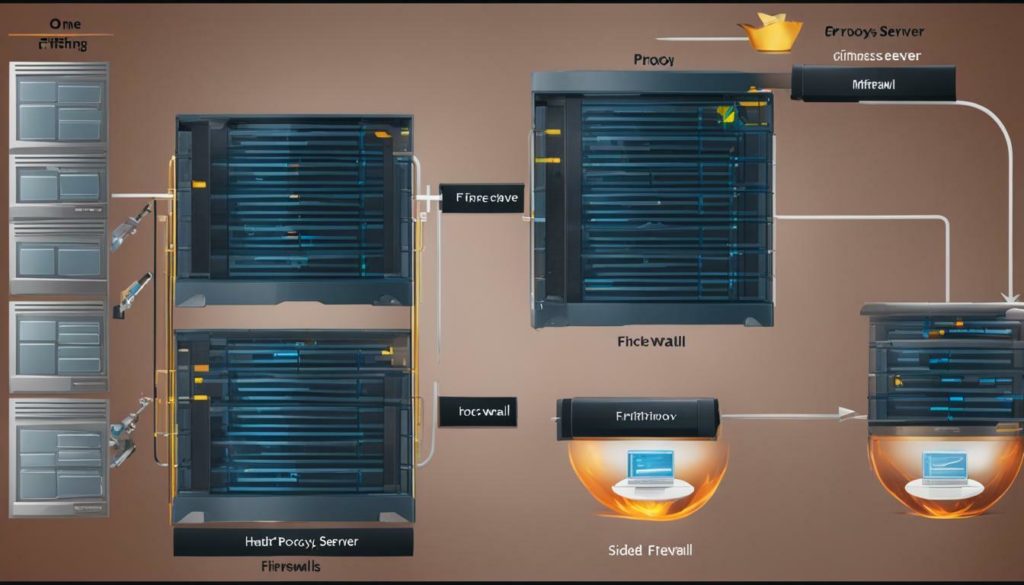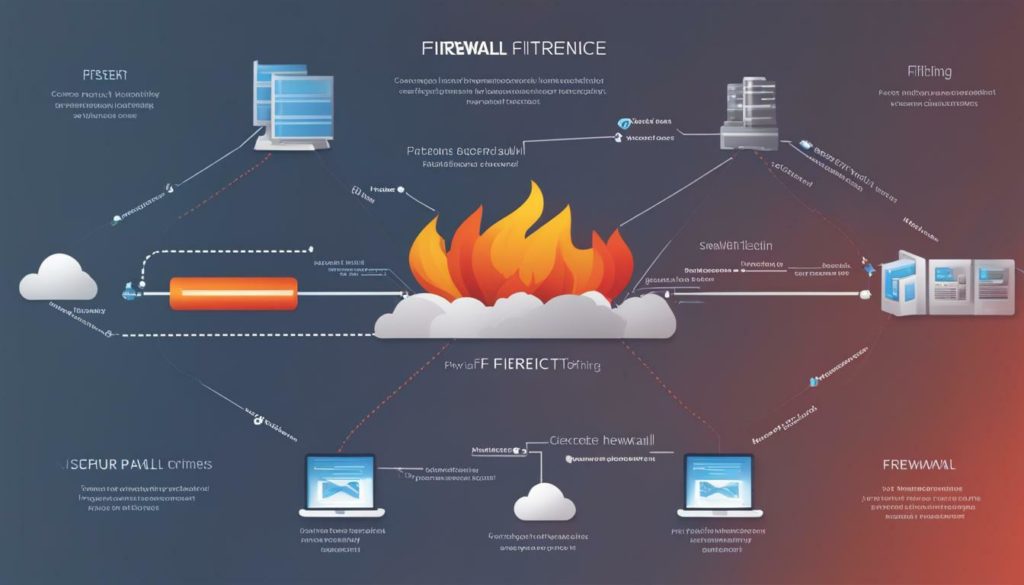Understanding the distinctions between a proxy server and a packet-filtering firewall can help organizations make informed decisions about their network security.
A proxy server acts as a middleman between a user’s device and the internet, enhancing privacy and bypassing content restrictions. It relays requests to websites and masks the user’s IP address. On the other hand, a packet-filtering firewall is a security tool that inspects data packets as they move across a network. It monitors and filters incoming and outgoing traffic within a local network based on predefined rules.
Proxy servers operate on the application protocol level and provide benefits such as enhanced anonymity and content filtering, while packet-filtering firewalls operate on the packet level and provide security by controlling packet flow. Both have advantages and disadvantages and serve different purposes in network security.
- Proxy servers act as intermediaries between user devices and the internet, enhancing privacy and bypassing content restrictions.
- Packet-filtering firewalls inspect data packets within a network and control traffic flow based on predefined rules.
- Proxy servers operate on the application protocol level, while packet-filtering firewalls operate on the packet level.
- Proxy servers offer enhanced anonymity and content filtering capabilities.
- Packet-filtering firewalls provide security by controlling packet flow within a network.
Proxy Server: Enhancing Privacy and Content Filtering
A proxy server acts as a middleman between a user’s device and the internet, providing enhanced privacy and allowing users to bypass content restrictions. It relays requests to websites on behalf of the user, effectively hiding their IP address and personal information from the websites they visit. This added layer of anonymity can be particularly beneficial for individuals seeking to protect their online privacy.
Moreover, proxy servers offer powerful content filtering capabilities, allowing administrators to control the types of content that can be accessed from a network. By implementing filtering rules, organizations can restrict access to specific websites, block potentially harmful or inappropriate content, and enforce acceptable use policies. These filtering features make proxy servers a valuable tool for maintaining a secure and productive network environment.
Additionally, proxy servers can cache data, which means that frequently accessed web pages or files can be stored locally on the server. When a user requests the same content again, the proxy server can serve it directly from its cache, resulting in faster load times and reduced bandwidth usage. This caching mechanism also allows multiple users within the same network to access the same content without putting additional strain on the internet connection.

A proxy server provides enhanced privacy by masking the user’s IP address and personal information.
Proxy servers offer content filtering capabilities, allowing organizations to control and restrict access to specific websites.
Proxy servers cache frequently accessed content, resulting in faster load times and reduced bandwidth usage.
| Proxy Server Features | Packet-Filtering Firewall Features |
|---|---|
| Enhanced anonymity and privacy | Control and filtering of packet flow |
| Content filtering capabilities | Inspection of data packets for security purposes |
| Data caching for faster load times | Monitoring and filtering of incoming and outgoing traffic |
In conclusion, proxy servers and packet-filtering firewalls serve different purposes in network security. While a proxy server excels in enhancing privacy, allowing users to bypass restrictions, and providing content filtering capabilities, a packet-filtering firewall focuses on controlling and filtering packet flow for improved security. Organizations must carefully evaluate their specific needs and requirements to determine whether a proxy server or a packet-filtering firewall is the right solution for their network security.
Packet-Filtering Firewall: Controlling Packet Flow for Security
In contrast to a proxy server, a packet-filtering firewall acts as a security tool that monitors and filters data packets as they move across a network. It inspects the headers and content of each packet, determining whether to allow or block its transmission based on predefined rules. By controlling packet flow, packet-filtering firewalls help ensure network security by restricting unauthorized access and protecting against potential threats.
Packet-filtering firewalls operate on the packet level, making decisions based on information such as source and destination IP addresses, port numbers, and protocol types. This allows them to identify and filter packets that may pose a risk to the network. They can be configured to allow or block specific types of traffic, effectively managing the flow of data within a local network.
One of the key advantages of a packet-filtering firewall is its simplicity and efficiency. It can process packets quickly, minimizing the impact on network performance. Additionally, packet-filtering firewalls are often less resource-intensive compared to other firewall types, making them suitable for use in environments with limited resources.
| Advantages of Packet-Filtering Firewall |
|---|
| Efficient packet processing |
| Low resource requirements |
| Ability to block specific types of traffic |
| Simple and cost-effective |
However, it is important to note that packet-filtering firewalls have limitations. They primarily focus on the packet headers and lack the ability to inspect the content within the packets. This can make them vulnerable to certain types of attacks, such as those that hide within allowed packets or use encrypted communication channels. Additionally, packet-filtering firewalls may not provide granular control over application-level protocols, which can limit their effectiveness in certain scenarios.
Overall, while a proxy server and a packet-filtering firewall both play important roles in network security, they differ in their features and capabilities. A proxy server enhances privacy and content filtering, operating on the application protocol level and providing users with anonymity and the ability to bypass content restrictions. On the other hand, a packet-filtering firewall focuses on controlling packet flow at the network level, offering efficient packet processing and the ability to block specific types of traffic.
Proxy Server vs Packet-Filtering Firewall: Purpose and Function
While a proxy server focuses on relaying requests to websites and masking user IP addresses, a packet-filtering firewall is primarily responsible for inspecting data packets and enforcing security rules. These two network security tools serve different purposes and provide unique benefits that organizations must consider when designing their security infrastructure.
A proxy server operates on the application protocol level, intercepting and forwarding requests from users to websites. It acts as an intermediary between the user’s device and the internet, ensuring that requests and responses are relayed securely. By relaying requests, the proxy server can mask the user’s IP address, enhancing privacy and anonymity. It also enables organizations to implement content filtering, allowing them to restrict access to specific websites or types of content. This makes proxy servers particularly useful for businesses that prioritize user privacy and wish to control internet access within their network.
On the other hand, a packet-filtering firewall operates on the packet level, examining individual data packets as they traverse a network. It inspects the packets’ source and destination addresses, as well as their port numbers and protocols. Based on predefined rules, the firewall decides whether to allow or block packets, providing granular control over network traffic. By monitoring and filtering incoming and outgoing packets, packet-filtering firewalls can prevent unauthorized access and protect against various types of attacks, such as denial-of-service (DoS) and distributed denial-of-service (DDoS) attacks. They offer a high level of network security by monitoring and controlling the flow of packets within a local network.
While proxy servers and packet-filtering firewalls both contribute to network security, their functions and benefits differ significantly. Proxy servers focus on enhancing privacy, enabling content filtering, and relaying requests, while packet-filtering firewalls prioritize the inspection and control of data packets. Organizations should carefully evaluate their needs and objectives to determine whether a proxy server, a packet-filtering firewall, or a combination of both is the most suitable solution for their network security requirements.

| Proxy Server | Packet-Filtering Firewall |
|---|---|
| Operates on the application protocol level | Operates on the packet level |
| Masks user IP addresses | Inspects packet source and destination addresses |
| Enhances privacy and anonymity | Enforces security rules |
| Allows content filtering | Filters incoming and outgoing packets |
| Relays user requests to websites | Controls packet flow within a network |
Conclusion
When it comes to network security, organizations must carefully consider the differences between proxy servers and packet-filtering firewalls. Proxy servers provide enhanced privacy, content filtering, and request relaying capabilities, while packet-filtering firewalls focus on inspecting and filtering data packets to enforce security rules. Ultimately, the choice between these two solutions depends on the specific needs and objectives of the organization, taking into account factors such as privacy requirements, content filtering policies, and the level of control needed over network traffic.
Proxy Server: Anonymity and Privacy
One of the key benefits of using a proxy server is the ability to maintain anonymity and privacy while accessing the internet. A proxy server acts as a middleman between a user’s device and the websites they visit, relaying requests and masking the user’s IP address. This means that when you connect to a website through a proxy server, the website only sees the proxy server’s IP address, not your own.
By hiding your IP address, a proxy server helps protect your personal information and online activities from being tracked by third parties. This is particularly important when using public Wi-Fi networks, where your data may be vulnerable to interception. With a proxy server, your connection is encrypted, adding an extra layer of security to safeguard your sensitive information.
“Using a proxy server can also bypass content restrictions imposed by governments or organizations. By routing your traffic through a server located in a different country, you can access websites and content that may be blocked in your current location.”

Furthermore, proxy servers often provide additional features such as content filtering. This allows you to control what types of websites and content can be accessed through the proxy server, adding an extra layer of control and security. By filtering out potentially malicious or inappropriate content, proxy servers help protect users from online threats and ensure a safer browsing experience.
In summary, a proxy server offers the benefits of anonymity, privacy, and content filtering. By hiding your IP address and encrypting your connection, it helps protect your personal information and online activities. Additionally, it allows you to bypass content restrictions and provides control over the type of websites and content that can be accessed. These features make a proxy server a valuable tool for individuals and organizations seeking to enhance their online security and privacy.
Packet-Filtering Firewall: Network Security
A packet-filtering firewall provides robust network security by filtering incoming and outgoing traffic based on predefined rules and protecting against potential threats. It operates on the packet level, examining individual data packets as they pass through the firewall. This granular approach allows the firewall to control the flow of packets and prevent unauthorized access to a network.

One of the key advantages of a packet-filtering firewall is its ability to block specific types of traffic based on configurable rules. These rules can be set to allow or deny packets based on their source IP address, destination IP address, port number, or other criteria. By enforcing these rules, the firewall can effectively filter out malicious traffic and potential threats, helping to ensure the security of the network.
A packet-filtering firewall also helps in preventing denial-of-service (DoS) attacks by limiting the number of packets that can pass through the network. It can be configured to drop or reject excessive incoming traffic, preventing the network from being overwhelmed by malicious or excessive requests. Additionally, packet-filtering firewalls can provide network address translation (NAT) capabilities, allowing multiple devices in a local network to share a single public IP address.
Packet-Filtering Firewall: Benefits at a Glance
- Granular control over network traffic
- Protection against potential threats and unauthorized access
- Ability to block specific types of traffic based on configurable rules
- Prevention of denial-of-service (DoS) attacks
- Network address translation (NAT) capabilities
Overall, a packet-filtering firewall is an essential component of network security, providing a strong line of defense against various cyber threats. Its ability to control packet flow and filter traffic based on predefined rules ensures that only legitimate and safe data is allowed to pass through the network, protecting sensitive information and maintaining the integrity of the network infrastructure.
| Packet-Filtering Firewall | Proxy Server |
|---|---|
| Operates on the packet level | Operates on the application protocol level |
| Controls packet flow | Relays requests to websites |
| Filters traffic based on configurable rules | Masks user’s IP address |
| Protects against unauthorized access | Enhances privacy and content filtering |
Proxy Server and Packet-Filtering Firewall: Advantages and Disadvantages
Both proxy servers and packet-filtering firewalls have their advantages and disadvantages, and understanding these distinctions is crucial for effective network security.
Proxy Server Advantages:
- Enhanced Privacy: Proxy servers act as intermediaries between users and the internet, masking their IP addresses and providing an additional layer of privacy.
- Content Filtering: Proxy servers can be configured to filter and block certain types of content, restricting access to potentially harmful or inappropriate material.
- Improved Performance: By caching frequently accessed web content, proxy servers can enhance browsing speed and reduce bandwidth usage, resulting in improved performance.
Packet-Filtering Firewall Advantages:
- Network Security: Packet-filtering firewalls monitor and filter incoming and outgoing traffic based on predefined rules, providing protection against unauthorized access and potential threats.
- Efficient Resource Utilization: Packet-filtering firewalls operate at the network layer, allowing for efficient management of network resources and ensuring only legitimate traffic is allowed.
- Simplicity: Packet-filtering firewalls are relatively simple to configure and manage, making them an attractive option for small to medium-sized businesses.
While proxy servers offer enhanced privacy and content filtering capabilities, packet-filtering firewalls focus on network security and efficient resource utilization. It’s important to note that neither solution is foolproof and may have their vulnerabilities and limitations.
To achieve comprehensive network security, organizations often employ a combination of both proxy servers and packet-filtering firewalls, taking advantage of their respective strengths and mitigating their weaknesses. By carefully considering the specific requirements and objectives of their network, businesses can make informed decisions on which solution or combination of solutions best suits their needs.

| Proxy Server | Packet-Filtering Firewall |
|---|---|
| Operates on the application protocol level | Operates on the packet level |
| Enhances privacy and content filtering | Focuses on network security and controlling packet flow |
| Provides anonymity and bypasses content restrictions | Monitors and filters traffic based on predefined rules |
Choosing the Right Solution for Network Security
When deciding between a proxy server and a packet-filtering firewall, organizations need to evaluate their specific security needs and objectives. A proxy server offers enhanced privacy and content filtering capabilities, making it suitable for those who prioritize anonymity and want to bypass content restrictions. It acts as a middleman between a user’s device and the internet, relaying requests to websites and masking the user’s IP address. This allows users to browse the web without revealing their true identity, which can be particularly important for individuals or businesses that handle sensitive information.
On the other hand, a packet-filtering firewall is designed to control packet flow and ensure network security. It operates on the packet level, inspecting data packets as they move across a network and filtering incoming and outgoing traffic based on predefined rules. This makes it an effective tool for enforcing security policies and protecting against unauthorized access or malicious activities.
Both proxy servers and packet-filtering firewalls have their own advantages and serve different purposes in network security. Proxy servers excel at providing anonymity and content filtering, while packet-filtering firewalls prioritize network security by controlling packet flow. Organizations should carefully consider their specific needs and objectives before making a decision. Factors such as the level of privacy required, the type of content filtering needed, and the desired level of control over network traffic should all be taken into account.
Ultimately, the choice between a proxy server and a packet-filtering firewall depends on the unique security requirements of each organization. It’s important to weigh the benefits and drawbacks of each solution to make an informed decision. By evaluating their specific needs and objectives, organizations can select the right solution that aligns with their network security goals.

| Proxy Server | Packet-Filtering Firewall | |
|---|---|---|
| Advantages |
|
|
| Disadvantages |
|
|
Conclusion
In conclusion, while both a proxy server and a packet-filtering firewall play crucial roles in network security, they differ in terms of their functions, features, and advantages. A proxy server acts as a middleman between a user’s device and the internet, enhancing privacy and bypassing content restrictions. It relays requests to websites and masks the user’s IP address, providing enhanced anonymity. Additionally, proxy servers offer content filtering capabilities, allowing organizations to control access to certain websites or types of content.
On the other hand, a packet-filtering firewall operates on the packet level, inspecting and filtering data packets as they move across a network. It focuses on monitoring and controlling incoming and outgoing traffic within a local network based on predefined rules. Packet-filtering firewalls provide security by controlling packet flow, which helps prevent unauthorized access and potential threats. However, unlike proxy servers, packet-filtering firewalls do not offer the same level of privacy and content filtering capabilities.
Both proxy servers and packet-filtering firewalls have their advantages and disadvantages, and the choice between the two depends on the specific security needs of an organization. Proxy servers are ideal for users who value privacy and want to bypass content restrictions, while packet-filtering firewalls are more suitable for network administrators who need to control traffic flow and ensure network security. It is essential to carefully evaluate the requirements and objectives before deciding which solution is best for network security.
Additional Information
For further information on network security and the differences between proxy servers and packet-filtering firewalls, consider exploring the following resources:
- Web Filtering Explained: A Guide to Content Filtering and Security
- Choosing Between a Proxy Server and a Firewall for Enhanced Network Security
- Best Practices for Network Security: Proxy Servers vs. Packet-Filtering Firewalls
Remember, ensuring network security is crucial in today’s digital landscape. By understanding the distinctions between proxy servers and packet-filtering firewalls, organizations can make informed decisions and implement the most appropriate solution for their specific security needs.
| Proxy Server | Packet-Filtering Firewall |
|---|---|
| Enhances privacy | Controls packet flow for security |
| Bypasses content restrictions | Monitors incoming and outgoing traffic |
| Masks IP address | Prevents unauthorized access |

Additional Information
For more information on network security and related topics, please refer to the additional resources below.
Network security is a vital aspect of protecting sensitive data and ensuring the integrity of a network. Understanding the differences between a proxy server and a packet-filtering firewall can help organizations make informed decisions regarding their network security infrastructure.
A proxy server offers enhanced privacy and content filtering capabilities by acting as an intermediary between a user’s device and the internet. It relays requests to websites, masking the user’s IP address and providing an additional layer of anonymity. Additionally, proxy servers can be used to bypass content restrictions, allowing users to access blocked websites or content.
On the other hand, a packet-filtering firewall focuses on controlling packet flow within a local network. It operates on the packet level, inspecting data packets as they move across the network. By monitoring and filtering incoming and outgoing traffic based on predefined rules, packet-filtering firewalls help prevent unauthorized access and protect against network threats.
It’s important to note that while proxy servers and packet-filtering firewalls serve different purposes in network security, they both have advantages and disadvantages. Proxy servers can provide enhanced anonymity and content filtering, while packet-filtering firewalls offer granular control over traffic flow and network security. The choice between the two depends on the specific needs and priorities of an organization.
Additional Resources
- Network Security Best Practices: A comprehensive guide on essential network security practices to protect against cyber threats.
- Choosing the Right Firewall: A comparison of different firewall types, including packet-filtering firewalls, to help organizations select the most suitable solution.
- Understanding Proxy Servers: An in-depth overview of how proxy servers work and their role in enhancing privacy and bypassing content restrictions.
FAQ
Q: How does a proxy server differ from a packet-filtering firewall?
A: A proxy server acts as a middleman between a user’s device and the internet, enhancing privacy and bypassing content restrictions. On the other hand, a packet-filtering firewall is a security tool that inspects data packets as they move across a network.
Q: What are the features and advantages of a proxy server?
A: A proxy server provides benefits such as enhanced anonymity and content filtering. It relays requests to websites and masks the user’s IP address.
Q: How does a packet-filtering firewall contribute to network security?
A: A packet-filtering firewall operates on the packet level and provides security by controlling packet flow within a local network based on predefined rules.
Q: What is the purpose and function of a proxy server compared to a packet-filtering firewall?
A: Proxy servers operate on the application protocol level and focus on enhancing privacy and content filtering, while packet-filtering firewalls operate on the packet level and provide security by controlling packet flow.
Q: What are the advantages of using a proxy server?
A: Using a proxy server offers benefits such as enhanced anonymity and privacy for users.
Q: How does a packet-filtering firewall contribute to network security?
A: A packet-filtering firewall provides network security by controlling packet flow and monitoring incoming and outgoing traffic within a local network based on predefined rules.
Q: What are the advantages and disadvantages of both proxy servers and packet-filtering firewalls?
A: Both proxy servers and packet-filtering firewalls have advantages and disadvantages, which should be considered when making decisions regarding network security.
Q: What factors should be considered when choosing between a proxy server and a packet-filtering firewall?
A: Factors such as specific security needs, privacy requirements, and network infrastructure should be considered when selecting the appropriate solution for network security.
Q: What are the main differences between a proxy server and a packet-filtering firewall?
A: The main differences between a proxy server and a packet-filtering firewall lie in their functionality and purpose in network security.
Q: Where can I find additional information about proxy servers and packet-filtering firewalls?
A: For additional information and resources related to this topic, you can refer to recommended security practices or further reading materials.








